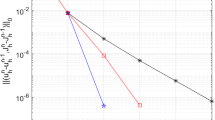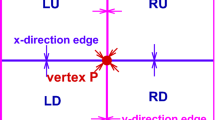Abstract
In this paper, we propose and analyze a mixed finite element scheme for stationary inductionless magnetohydrodynamic equations on a general Lipschitz domain. We adopt divergence-conforming elements for the velocity and the current density, discontinuous elements for the pressure and the electric potential, thus the approximations for velocity and current density are exactly divergence-free. The \(\mathbf{H }^{1}\)-continuity of the velocity is enforced by discontinuous Galerkin approach. With this discretization, we prove the well-posedness of the discrete scheme, and derive optimal error estimates of the discrete solutions. In particular, we show that the error estimates for the velocity and the current density are independent of the pressure and the electric potential, and the error estimates for the pressure and the electric potential are also unrelated to each other. Based on this, we propose two coupled iterative methods: Stokes and Oseen iterations. Rigorous analysis of convergence and stability is provided. Finally, some numerical examples are performed to verify the theoretical results and show the effectiveness of the presented methods.



Similar content being viewed by others
References
Abdou, M., Ying, A., al. et: On the exploration of innovative concepts for fusion chamber technology. FUSION. ENG. DES. 54(2), 181–247 (2001). https://doi.org/10.1016/S0920-3796(00)00433-6. http://doi.org/10.1016/s0920-3796%2800%2900433-6. Publisher: Elsevier Science
Arnold, D.N.: An interior penalty finite element method with discontinuous elements. SIAM J. Numer. Anal. 19(4), 742–760 (1982). https://doi.org/10.1137/0719052
Arnold, D.N., Brezzi, F., Cockburn, B., Marini, L.D.: Unified analysis of discontinuous Galerkin methods for elliptic problems. SIAM J. Numer. Anal. 39(5), 1749–1779 (2001/02). https://doi.org/10.1137/S0036142901384162
Badia, S., Martín, A.F., Planas, R.: Block recursive LU preconditioners for the thermally coupled incompressible inductionless MHD problem. J. Comput. Phys. 274, 562–591 (2014). https://doi.org/10.1016/j.jcp.2014.06.028
Brezzi, F., Fortin, M.: Mixed and hybrid finite element methods, Springer Series in Computational Mathematics, vol. 15. Springer-Verlag, New York (1991). https://doi.org/10.1007/978-1-4612-3172-1
Cockburn, B., Kanschat, G., Schötzau, D.: The local discontinuous Galerkin method for the Oseen equations. Math. Comp. 73(246), 569–593 (2004). https://doi.org/10.1090/S0025-5718-03-01552-7
Cockburn, B., Kanschat, G., Schotzau, D.: A locally conservative LDG method for the incompressible Navier-Stokes equations. Math. Comp. 74(251), 1067–1095 (2005). https://doi.org/10.1090/S0025-5718-04-01718-1
Cockburn, B., Kanschat, G., Schötzau, D.: A note on discontinuous Galerkin divergence-free solutions of the Navier-Stokes equations. J. Sci. Comput. 31(1–2), 61–73 (2007). https://doi.org/10.1007/s10915-006-9107-7
Davidson, P.A.: An introduction to magnetohydrodynamics. Cambridge Texts in Applied Mathematics. Cambridge University Press, Cambridge (2001). https://doi.org/10.1017/CBO9780511626333
Dong, X., He, Y., Zhang, Y.: Convergence analysis of three finite element iterative methods for the 2D/3D stationary incompressible magnetohydrodynamics. Comput. Methods Appl. Mech. Engrg. 276, 287–311 (2014). https://doi.org/10.1016/j.cma.2014.03.022
Ervin, V.J., Layton, W.J.: A posteriori error estimation for two level discretizations of flows of electrically conducting, incompressible fluids. Comput. Math. Appl. 31(11), 105–114 (1996). https://doi.org/10.1016/0898-1221(96)00067-3
Gerbeau, J.F., Le Bris, C., Lelièvre, T.: Mathematical methods for the magnetohydrodynamics of liquid metals. Numerical Mathematics and Scientific Computation. Oxford University Press, Oxford (2006). https://doi.org/10.1093/acprof:oso/9780198566656.001.0001
Girault, V., Raviart, P.A.: Finite element methods for Navier-Stokes equations, Springer Series in Computational Mathematics, vol. 5. Springer-Verlag, Berlin (1986). https://doi.org/10.1007/978-3-642-61623-5. Theory and algorithms
Girault, V., Rivière, B., Wheeler, M.F.: A discontinuous Galerkin method with nonoverlapping domain decomposition for the Stokes and Navier-Stokes problems. Math. Comp. 74(249), 53–84 (2005). https://doi.org/10.1090/S0025-5718-04-01652-7
Greif, C., Li, D., Schötzau, D., Wei, X.: A mixed finite element method with exactly divergence-free velocities for incompressible magnetohydrodynamics. Comput. Methods Appl. Mech. Engrg. 199(45–48), 2840–2855 (2010). https://doi.org/10.1016/j.cma.2010.05.007
He, Y.: Stability and convergence of iterative methods related to viscosities for the 2D/3D steady Navier-Stokes equations. J. Math. Anal. Appl. 423(2), 1129–1149 (2015). https://doi.org/10.1016/j.jmaa.2014.10.037
He, Y., Li, J.: Convergence of three iterative methods based on the finite element discretization for the stationary Navier-Stokes equations. Comput. Methods Appl. Mech. Engrg. 198(15–16), 1351–1359 (2009). https://doi.org/10.1016/j.cma.2008.12.001
Hecht, F.: New development in freefem++. J. NUMER. MATH. 20 (2012). https://doi.org/10.1515/jnum-2012-0013
Hiptmair, R., Li, L., Mao, S., Zheng, W.: A fully divergence-free finite element method for magnetohydrodynamic equations. Math. Models Methods Appl. Sci. 28(4), 659–695 (2018). https://doi.org/10.1142/S0218202518500173
Hu, K., Ma, Y., Xu, J.: Stable finite element methods preserving \(\nabla \cdot B=0\) exactly for MHD models. Numer. Math. 135(2), 371–396 (2017). https://doi.org/10.1007/s00211-016-0803-4
John, V.: Finite element methods for incompressible flow problems, Springer Series in Computational Mathematics, vol. 51. Springer, Cham (2016). https://doi.org/10.1007/978-3-319-45750-5
John, V., Linke, A., Merdon, C., Neilan, M., Rebholz, L.G.: On the divergence constraint in mixed finite element methods for incompressible flows. SIAM Rev. 59(3), 492–544 (2017). https://doi.org/10.1137/15M1047696
Layton, W., Lenferink, H.W.J., Peterson, J.S.: A two-level Newton, finite element algorithm for approximating electrically conducting incompressible fluid flows. Comput. Math. Appl. 28(5), 21–31 (1994). https://doi.org/10.1016/0898-1221(94)00137-5
Layton, W.J., Meir, A.J., Schmidt, P.G.: A two-level discretization method for the stationary MHD equations. Electron. Trans. Numer. Anal. 6(12), 198–210 (1997)
Li, L., Ni, M., Zheng, W.: A charge-conservative finite element method for inductionless MHD equations. Part I: Convergence. SIAM J. Sci. Comput. 41(4), B796–B815 (2019). https://doi.org/10.1137/17M1160768
Long, X.: The analysis of finite element method for the inductionless mhd equations. University of Chinese Academy of Sciences, PhD Dissertation pp. 1–123 (2019)
Ni, M.J., Li, J.F.: A consistent and conservative scheme for incompressible MHD flows at a low magnetic Reynolds number. Part III: On a staggered mesh. J. Comput. Phys. 231(2), 281–298 (2012). https://doi.org/10.1016/j.jcp.2011.08.013
Ni, M.J., Munipalli, R., Huang, P., Morley, N.B., Abdou, M.A.: A current density conservative scheme for incompressible MHD flows at a low magnetic Reynolds number. II. On an arbitrary collocated mesh. J. Comput. Phys. 227(1), 205–228 (2007). https://doi.org/10.1016/j.jcp.2007.07.023
Ni, M.J., Munipalli, R., Morley, N.B., Huang, P., Abdou, M.A.: A current density conservative scheme for incompressible MHD flows at a low magnetic Reynolds number. I. On a rectangular collocated grid system. J. Comput. Phys. 227(1), 174–204 (2007). https://doi.org/10.1016/j.jcp.2007.07.025
Peterson, J.S.: On the finite element approximation of incompressible flows of an electrically conducting fluid. Numer. Methods Partial Differ. Eq. 4(1), 57–68 (1988). https://doi.org/10.1002/num.1690040105
Planas, R., Badia, S., Codina, R.: Approximation of the inductionless MHD problem using a stabilized finite element method. J. Comput. Phys. 230(8), 2977–2996 (2011). https://doi.org/10.1016/j.jcp.2010.12.046
Su, H., Feng, X., Huang, P.: Iterative methods in penalty finite element discretization for the steady MHD equations. Comput. Methods Appl. Mech. Engrg. 304, 521–545 (2016). https://doi.org/10.1016/j.cma.2016.02.039
Yuksel, G., Ingram, R.: Numerical analysis of a finite element, Crank-Nicolson discretization for MHD flows at small magnetic Reynolds numbers. Int. J. Numer. Anal. Model. 10(1), 74–98 (2013)
Yuksel, G., Isik, O.R.: Numerical analysis of Backward-Euler discretization for simplified magnetohydrodynamic flows. Appl. Math. Model. 39(7), 1889–1898 (2015). https://doi.org/10.1016/j.apm.2014.10.007
Zhang, G.D., He, Y., Yang, D.: Analysis of coupling iterations based on the finite element method for stationary magnetohydrodynamics on a general domain. Comput. Math. Appl. 68(7), 770–788 (2014). https://doi.org/10.1016/j.camwa.2014.07.025
Zhang, X., Ding, Q.: Coupled iterative analysis for stationary inductionless magnetohydrodynamic system based on charge-conservative finite element method. J. Sci. Comput. 88(2), 1–32 (2021). https://doi.org/10.1007/s10915-021-01553-5
Acknowledgements
The authors would like to thank anonymous referees for their useful comments and suggestions which have helped to improve the paper greatly.
Author information
Authors and Affiliations
Corresponding author
Additional information
Publisher's Note
Springer Nature remains neutral with regard to jurisdictional claims in published maps and institutional affiliations.
Rights and permissions
About this article
Cite this article
Zhang, X., Wang, X. A Fully Divergence-Free Finite Element Scheme for Stationary Inductionless Magnetohydrodynamic Equations. J Sci Comput 90, 70 (2022). https://doi.org/10.1007/s10915-021-01708-4
Received:
Revised:
Accepted:
Published:
DOI: https://doi.org/10.1007/s10915-021-01708-4
Keywords
- Mixed finite element method
- Divergence-free
- Inductionless MHD equations
- Conservation of charge and mass




